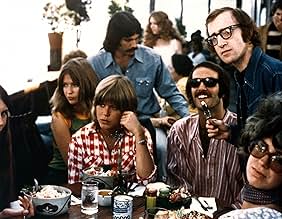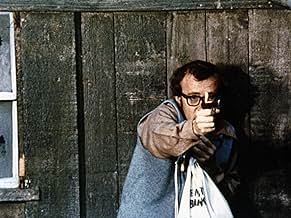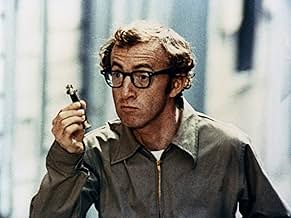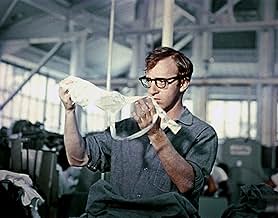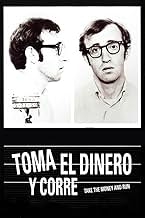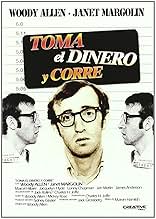NOTE IMDb
7,2/10
32 k
MA NOTE
La vie et l'histoire de Virgil Starkwell, braqueur de banque incapable.La vie et l'histoire de Virgil Starkwell, braqueur de banque incapable.La vie et l'histoire de Virgil Starkwell, braqueur de banque incapable.
- Réalisation
- Scénario
- Casting principal
- Récompenses
- 3 nominations au total
Dan Frazer
- Julius Epstein - The Psychiatrist
- (as Don Frazier)
Jackson Beck
- The Narrator
- (voix)
Avis à la une
Very early Woody Allen winner has the all-time lovable loser trying to make ends meet with girlfriend and future wife Janet Margolin. Allen, obviously pretty unskilled in most everything, decides that he can do just what the title of the film says and achieve true happiness with his one true love. Documentary-styled footage makes the picture unfold in a quietly uproarious way as Allen uses corny techniques used by most news organizations to tell a story that would have looked very odd without his insight being involved. Allen's films only work because he makes them work usually and that is definitely the case with "Take the Money and Run". Once again he shows unlimited potential and would use this movie, more than any other, as a spring-board for much future success in the 1970s, 1980s and beyond. 4 stars out of 5.
TAKE THE MONEY AND RUN is Mel Brooks-like in structure and gags, but definitely Woody Allen at his comical best. Its not his greatest picture by any means, but perhaps the best of his early slapstick flicks (SLEEPER, BANANAS). "Virgil Starkwell" has a hard time stealing right from the start. When a criminal gets a gumball machine "stuck to his hand", you know he's in the wrong gig. Woody Allen is right at home with this innocent, documentary-style drip on the unintentional hilarity of 60's crime documentaries. Woody, or "Virgil", seems to be playing Woody as usual, something we all know runs through his entire body of work. This movie is very much like his innovative ZELIG of 1983, a black and white docu-spoof about a fictional chameleon.
Jackson Beck's narration is PERFECT in making the outrageous material seem "serious". It no doubt inspired the short spoofs "Saturday Night Live" would go on to produce for years, investigative reporting seemingly important, yet ridiculous in content. "Virgil's" parents are in disguise (Groucho Marx nose and glasses) whenever they are "interviewed". The chain gang escape is one of the funniest sequences I have ever seen. Woody also moves into romantic territory with the beautiful Janet Margolin, who had a nice, fat purse for "Virgil" to steal, but also has a quick reaction to his inept robbery attempt and, of course, they fall in love. She is there for "Virgil" to live for during his always brief prison stays and to pick out his clothes for a robbery. There are some familiar elements here, most obviously the beautiful young girl falling for a middle-aged homely Woody.
TAKE THE MONEY AND RUN is all about raw comedic filmmaking and mockery. It is not a situational film at all, just a bunch of perfectly cohesive episodes of this perfectly moronic bank robber, who spells gun G-U-B. Wouldn't that throw us all off if we were the bank tellers taking a note during a stick up ?
Jackson Beck's narration is PERFECT in making the outrageous material seem "serious". It no doubt inspired the short spoofs "Saturday Night Live" would go on to produce for years, investigative reporting seemingly important, yet ridiculous in content. "Virgil's" parents are in disguise (Groucho Marx nose and glasses) whenever they are "interviewed". The chain gang escape is one of the funniest sequences I have ever seen. Woody also moves into romantic territory with the beautiful Janet Margolin, who had a nice, fat purse for "Virgil" to steal, but also has a quick reaction to his inept robbery attempt and, of course, they fall in love. She is there for "Virgil" to live for during his always brief prison stays and to pick out his clothes for a robbery. There are some familiar elements here, most obviously the beautiful young girl falling for a middle-aged homely Woody.
TAKE THE MONEY AND RUN is all about raw comedic filmmaking and mockery. It is not a situational film at all, just a bunch of perfectly cohesive episodes of this perfectly moronic bank robber, who spells gun G-U-B. Wouldn't that throw us all off if we were the bank tellers taking a note during a stick up ?
For those of you who think that all Woody Allen's movies are vapid stories of neurotic rich New Yorkers, you need to see his early movies. "Take the Money and Run" is a good example. Allen plays Virgil Starkwell, an inept criminal. No matter what sort of crime he tries to pull off, something always goes wrong. Probably the funniest scene is when he tries to escape from jail like John Dillinger did. Other scenes include the time when the authorities use him in an experiment, with a silly result.
Anyway, Woody Allen's old movies were really funny. The thing was that he created a bunch of outlandish premises and infused his New York Jewish humor. This is what comedy is all about!
Anyway, Woody Allen's old movies were really funny. The thing was that he created a bunch of outlandish premises and infused his New York Jewish humor. This is what comedy is all about!
Virgil Starkwell was a product of his environment. Born into a poor family living in a rough community, Virgil soon finds companionship with a rough crowd and gets sucked into a life of petty crime from a very young age. An interest in the cello is not enough to set him straight and his acts continue into adulthood. Love, a powerful motivator, proves to be his undoing as he tries to rob a bank to fund his relationship.
We all talk about Allen's "earlier, funnier" films (even he does) but this probably doesn't extend the whole way to the very start of his film career because this, his second film, isn't up to the standard of Love & Death, Annie Hall and the like. The film is a mockumentary looking at the life and career of failing small-time criminal Virgil Starkwell and as such there is a basic narrative to provide some structure. Supposedly tightened up significantly in the editing room, the film is still pretty baggy at times and doesn't really have the material to carry it to even 85 minutes. However what the film does do well is produce plenty of imaginative moments that made me laugh out of nothing. I think of the scene where Virgil hires a car to run his blackmailer down, the spelling errors on the notes and others that are imaginative twists on what you expect and funnier for it. The one liners (and dialogue generally) is not as strong as Allen fans would hope for because the humour tends towards the sight gag.
This isn't a criticism because the sight gags are mostly good but the problem is one of consistency. I wasn't laughing anywhere enough for this to be a memorable comedy and there were quite a few lulls. These came particularly where the film had a section of narrative or dialogue rather than fast visual snippets under the narrator it is the latter that are the strongest parts of the film but they can't come quick enough and there isn't enough to support it in-between. Allen makes a good lead of course and I found him to be very good at delivering the visual comedy. Margolin is a bit too stiff; not good enough at the comedy or the dramatic stuff. The rest of the support cast does what they are required to do but the film does belong to Allen and his script. Credit should go to editor Rosenblum for making it as tight as possible and keeping the visual gags flowing as best as he can while limiting the weaker dialogue bits.
Overall then an amusing film that will appeal mostly to Woody Allen films. There are plenty of imaginative comedy moments but it is not as consistent as it needed to be to consider it on the same level as Allen's finest films (that would follow this in the 1970's in my opinion).
We all talk about Allen's "earlier, funnier" films (even he does) but this probably doesn't extend the whole way to the very start of his film career because this, his second film, isn't up to the standard of Love & Death, Annie Hall and the like. The film is a mockumentary looking at the life and career of failing small-time criminal Virgil Starkwell and as such there is a basic narrative to provide some structure. Supposedly tightened up significantly in the editing room, the film is still pretty baggy at times and doesn't really have the material to carry it to even 85 minutes. However what the film does do well is produce plenty of imaginative moments that made me laugh out of nothing. I think of the scene where Virgil hires a car to run his blackmailer down, the spelling errors on the notes and others that are imaginative twists on what you expect and funnier for it. The one liners (and dialogue generally) is not as strong as Allen fans would hope for because the humour tends towards the sight gag.
This isn't a criticism because the sight gags are mostly good but the problem is one of consistency. I wasn't laughing anywhere enough for this to be a memorable comedy and there were quite a few lulls. These came particularly where the film had a section of narrative or dialogue rather than fast visual snippets under the narrator it is the latter that are the strongest parts of the film but they can't come quick enough and there isn't enough to support it in-between. Allen makes a good lead of course and I found him to be very good at delivering the visual comedy. Margolin is a bit too stiff; not good enough at the comedy or the dramatic stuff. The rest of the support cast does what they are required to do but the film does belong to Allen and his script. Credit should go to editor Rosenblum for making it as tight as possible and keeping the visual gags flowing as best as he can while limiting the weaker dialogue bits.
Overall then an amusing film that will appeal mostly to Woody Allen films. There are plenty of imaginative comedy moments but it is not as consistent as it needed to be to consider it on the same level as Allen's finest films (that would follow this in the 1970's in my opinion).
Woody Allen hit gold with his second film, "Take the Money and Run", which is a basic film that works on so many levels and is memorable strictly for its charm and good wit.
The story follows Allen's Virgil Starkwell, whose life is told in documentary fashion. We learn he had a strange childhood and turned to crime to fulfill his needs. We learn of his romance and sympathize with him as we engage in prison escapes and witness him put in a chain gang. The documentary style might prove to be a "gimmick" of sorts, but it works because had the story been told any other way it simply would not have worked.
Also, "Take the Money" is an early token of what's to come and what the general audience will expect of Allen; smooth drama balanced by fast, witty monologues and lots of self-humiliation. To see this is to witness the early work of the director who ultimately brought us "Bananas", "Sleeper", "Manhattan", and the Oscar-winning "Annie Hall". And if anything, just track it for its over-the-top humor, not as in-your-face funny as "Sleeper" or as sexually hilarious as "Annie Hall", but it's warm and withdrawn, balanced all together by a very good ending (always one of the weaker parts in almost all of Allen's films).
Highly recommended! ***+ (8.5/10)
The story follows Allen's Virgil Starkwell, whose life is told in documentary fashion. We learn he had a strange childhood and turned to crime to fulfill his needs. We learn of his romance and sympathize with him as we engage in prison escapes and witness him put in a chain gang. The documentary style might prove to be a "gimmick" of sorts, but it works because had the story been told any other way it simply would not have worked.
Also, "Take the Money" is an early token of what's to come and what the general audience will expect of Allen; smooth drama balanced by fast, witty monologues and lots of self-humiliation. To see this is to witness the early work of the director who ultimately brought us "Bananas", "Sleeper", "Manhattan", and the Oscar-winning "Annie Hall". And if anything, just track it for its over-the-top humor, not as in-your-face funny as "Sleeper" or as sexually hilarious as "Annie Hall", but it's warm and withdrawn, balanced all together by a very good ending (always one of the weaker parts in almost all of Allen's films).
Highly recommended! ***+ (8.5/10)
Le saviez-vous
- AnecdotesThe first widely-released "mockumentary".
- GaffesAs the chain gang escapes, they climb the same embankment twice.
- ConnexionsFeatured in The Dick Cavett Show: Woody Allen (1971)
Meilleurs choix
Connectez-vous pour évaluer et suivre la liste de favoris afin de recevoir des recommandations personnalisées
- How long is Take the Money and Run?Alimenté par Alexa
Détails
- Date de sortie
- Pays d’origine
- Langues
- Aussi connu sous le nom de
- Take the Money and Run
- Lieux de tournage
- Sociétés de production
- Voir plus de crédits d'entreprise sur IMDbPro
Box-office
- Budget
- 1 500 000 $US (estimé)
- Durée1 heure 25 minutes
- Mixage
- Rapport de forme
- 1.85 : 1
Contribuer à cette page
Suggérer une modification ou ajouter du contenu manquant

Lacune principale
By what name was Prends l'oseille et tire-toi! (1969) officially released in India in English?
Répondre


